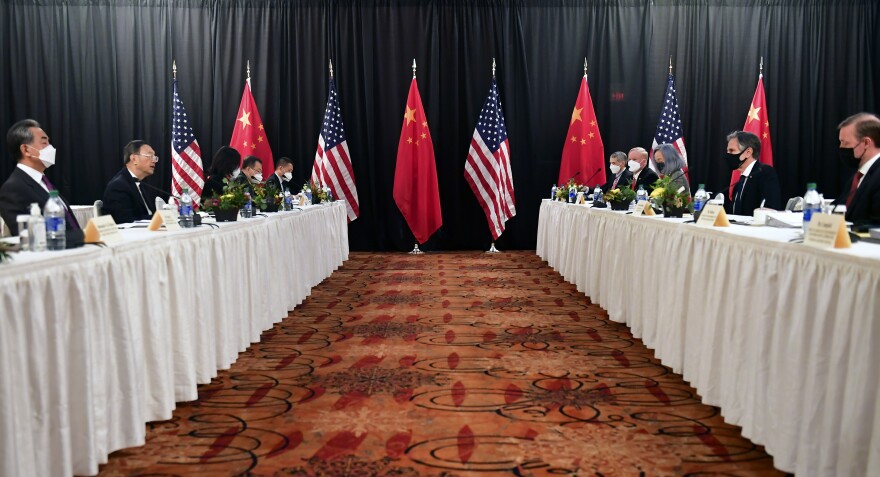Updated March 19, 2021 at 3:24 AM ET
The first face-t0-face meeting between U.S. and Chinese officials got off to a heated start Thursday. For more than an hour, top officials traded barbs at what would normally be a photo-op ahead of a two-day meeting in Anchorage, Alaska.
The planned opening address, meant to take just a few minutes at the start of the meeting, stretched on for more than an hour as both sides attempted to get the final say. During the acrimonious exchange, both the Chinese and U.S. teams repeatedly called reporters into the room to add remarks, according to reporters present during the meeting.
The meeting included U.S. Secretary of State Antony Blinken, national security adviser Jake Sullivan, Chinese Foreign Minister Wang Yi and Yang Jiechi, director of the Central Foreign Affairs Commission of the Chinese Communist Party.
At the top of the meeting, Blinken laid out American concerns with Chinese policy, according to NPR China correspondent John Ruwitch. Blinken said China's recent actions against international allies pose a threat to "the rules based order that maintains global stability."
Blinken then criticized China for human rights issues in Hong Kong, where the mainland has jailed pro-democracy advocates, and in the country's far-western Xinjiang region. The nation's minority Muslim population is facing wide-scale repression there. U.S. officials have previously called China's actions against the Uighurs there a "genocide."
The conference Thursday followed meetings in Asia last week in which U.S. officials met with Japanese and South Korean officials. Blinken and Secretary of Defense Lloyd Austin called out China's actions against U.S. allies during that trip as well.
China resisted commenting on Blinken's messages during that trip, but laid into Blinken following opening remarks Thursday.
Yang, China's top foreign policy official, said the U.S. should focus on its own issues instead of using its military and economic might to suppress other countries.
He said, "Many people within the United States actually have little confidence in the democracy of the United States, and they have various views regarding the government of the United States. In China, according to opinion polls, the leaders of China have the wide support of the Chinese people. "
He went on to say that the U.S. has its own human rights issues, pointing to recent civil rights protests. He said the grievances voiced by movements such as Black Lives Matter are deep-seated and are not a recent phenomena.
Tense relations
Chinese and U.S. officials will meet again Friday morning. A senior administration official told NPR diplomatic correspondent Michele Kelemen that U.S. officials will use the remaining time to double down on their messaging.
The Biden administration official accused the Chinese delegation of arriving intent on grandstanding and focusing on public theatrics and theatrics over substance.
Relations between the U.S. and China were tense under the Trump administration. Chinese officials have openly expressed a hope that the relationship could return to some semblance of calm following the previous tumultuous four years.
Under the Trump administration, the White House used a series of tariffs and sanctions to pressure China over trade, perceived unfair business practices and technology. Conflicts would extend to the origins of the coronavirus pandemic.
Copyright 2021 NPR. To see more, visit https://www.npr.org.



